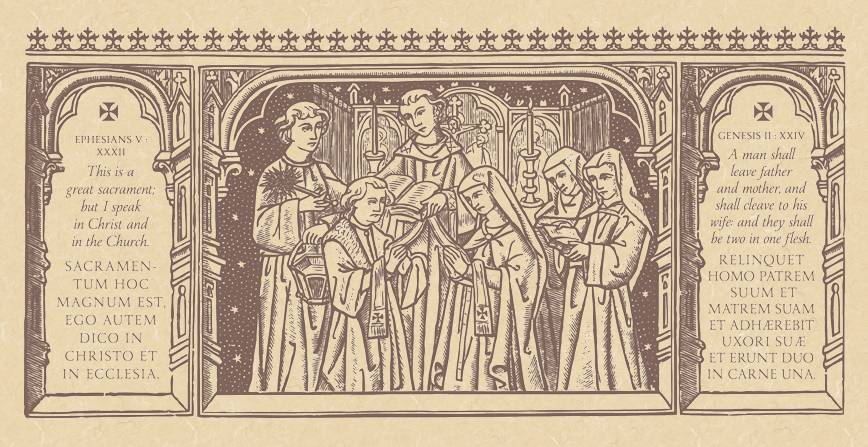A Short Primer on What Used to Be Catholic Spirituality.
The Nineteenth Friday of Ordinary Time.
Lessons from the primary feria, according to the ordinary form of the Roman Rite:
• Joshua 24: 1-13.
• Psalm 136: 1-3, 16-18, 21-22, 24.
• Matthew 19: 3-12.
The Tenth Friday after Pentecost; and, the Commemoration of Saint Agapitus, Martyr.*
Lessons from the dominica**, according to the extraordinary form of the Roman Rite:
• I Corinthians 12: 2-11.
• Psalm 16: 8, 2.
• Luke 18: 9-1.
|
When a Mass for the commemoration is taken, lessons from the common "Lætábitur…" of a Martyr not a Bishop:
• II Timothy 2: 8-10; 3: 10-12.
• Psalm 36: 24, 26.
• Matthew 10: 26-32.
|
The Tenth Friday after Pentecost; a Postfestive Day of the Dormition; and, the Feast of the Holy Martyrs Florus & Laurus.
Lessons from the pentecostarion, according to the Ruthenian recension of the Byzantine Rite:
• II Corinthians 4: 13-18.
• Matthew 24: 27-33, 42-51.
FatherVenditti.com
|
 9:04 AM 8/18/2017 — All this week and last week we’ve been reading from the historical books of the Old Testament, and if my mind were as agile as it used to be I’d have dived right in and dazzled you with all sorts of esoteric and useless insights. But it isn’t and I didn’t. Regarding our Gospel lesson today, it’s quite clear from the narrative, as it is to common sense, that not everyone is called to a celibate life; and, even if one was prone to debate the value of priestly celibacy in today’s world—which I am not—it’s instructive to see that, in even numbered years, this Gospel lesson is paired with one from Ezekiel, in which the holy Prophet describes an unfaithful Jerusalem as a young woman too captivated by her own charms, flirting with every passing fancy: 9:04 AM 8/18/2017 — All this week and last week we’ve been reading from the historical books of the Old Testament, and if my mind were as agile as it used to be I’d have dived right in and dazzled you with all sorts of esoteric and useless insights. But it isn’t and I didn’t. Regarding our Gospel lesson today, it’s quite clear from the narrative, as it is to common sense, that not everyone is called to a celibate life; and, even if one was prone to debate the value of priestly celibacy in today’s world—which I am not—it’s instructive to see that, in even numbered years, this Gospel lesson is paired with one from Ezekiel, in which the holy Prophet describes an unfaithful Jerusalem as a young woman too captivated by her own charms, flirting with every passing fancy:
But you were captivated by your own beauty, you used your renown to make yourself a harlot, and you lavished your harlotry on every passer-by, whose own you became (Ez. 16: 15 RM3).
It’s not so much about chastity or celibacy or holy purity—except by analogy—as it is about the need to avoid what the spiritual doctors of a previous age describe as “human respect”: conducting our affairs and styling our outward manner so as to be respected by others, even those who do not share our faith. When we do it ourselves we run the risk of side-tracking our eternal salvation for the sake of getting along and fitting in; when it’s done by the Church—such as when the Church takes on secular causes like the environment, thinking that doing so will cause the non-believing strata of society to look upon the Church more favorably—it only serves to confuse and demoralize the faithful.
To live in the midst of this world without being a part of it; to pace out the course of our lives as pilgrims whose journey does not end except in heaven: that is the faith that Jesus challenges us to embrace. There isn't one of us here who hasn't failed to embrace that faith at some point in his or her life; but, thanks be to God, we have a Savior who understands our human condition because He became one. He took our sins upon Himself, and offered Himself as a sacrifice on the altar of the Cross, a sacrifice which we will have reproduced for us upon this altar, and the broken Body of our God will again be offered to us to adore and receive in Holy Communion. That is a great grace, and one that can overcome all our lack of faith, if we will only dispose ourselves to allow it, and replace in ourselves the desire to be accepted with the desire to be saved.

* St. Agapitus, when only fifteen years old, endured many cruel tortures, and was beheaded at Præneste, Italy in the year 275.
** In the extraordinary form, on ferias outside privileged seasons, the lessons come from the previous Sunday.
|

